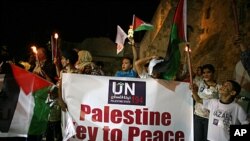Palestinian President Mahmoud Abbas says he will seek full membership to the United Nations next week. Analysts say the effort is unlikely to succeed and will likely set back the Palestinians efforts for statehood.
To be accepted as a full United Nations member, Palestinians will face a Security Council vote.
Analysts say Abbas’ bid is bound to fail, because the United States has made clear it will veto any attempt at Palestinian statehood through the Security Council. Washington believes the only way to achieve peace in the Middle East is through direct talks between Israel and the Palestinian Authority.
Message to U.S.
Khaled Elgindy, a former adviser to the Palestinian leadership on negotiations with Israel, says by going to the Security Council, the Palestinians are sending a message to the United States.
“It’s a message, really, of a lack of confidence in American management of the peace process," said Elgindy. "And that they are unhappy with the way things have gone and that the United States, really, hasn’t come up with an alternative strategy, an alternative approach. They [the U.S.] have made clear that they are opposed to the U.N. bid and that they would veto it, but they haven’t come up really with a viable alternative to it.”
Elgindy says a U.S. veto will undercut Washington’s standing in the region. “. . . and at a moment when, it is a very sensitive moment in the history of the region given the turmoil, the changes that are happening next door in Egypt and around them - in Syria and elsewhere - the United States’ standing right now in the region is very, very low and this would only add to that,” he said.
But John Bolton, former U.S. Ambassador to the United Nations, does not believe a U.S. veto would lower Washington’s standing in the Arab world.
“No, I don’t think so. I think the Arab world fully understands where the U.S. is. They may not like it, but it wouldn’t be a surprise if the U.S. did cast a veto in the Security Council,” he said.
Arab Spring fever
Many analysts are asking why Abbas would press the statehood issue at the Security Council now.
Khaled Elgindy says one reason has to do with the lack of progress in the peace process. Palestinians and Israelis have been deadlocked for months over the possible resumption of talks.
“And then, I think, propelling things further, or giving it greater urgency, is the Arab Spring, this kind of revolutionary fervor that is spreading around the region. And so the Palestinian leadership is under a lot of pressure to show some results for their - not one or two or three years of peace-processing - but really almost two decades now - and they have nothing to show for this approach,” said Elgindy.
Bolton says the peace process will be difficult to revive. “It’s dead in the water," he said. "And I suspect that’s part of the reason, in Abbas’ mind, why he wants to proceed with something in the United Nations. But honestly, that doesn’t make the peace process any easier, I think it makes it more difficult.”
Analysts say if, as expected, the U.S. casts a veto at the Security Council, the Palestinians could take their statehood request to the General Assembly.
But experts say if their move is accepted, they will not get full member status - they will only upgrade their current observer standing.
Analysts: Palestinian UN Bid Likely to Fail




